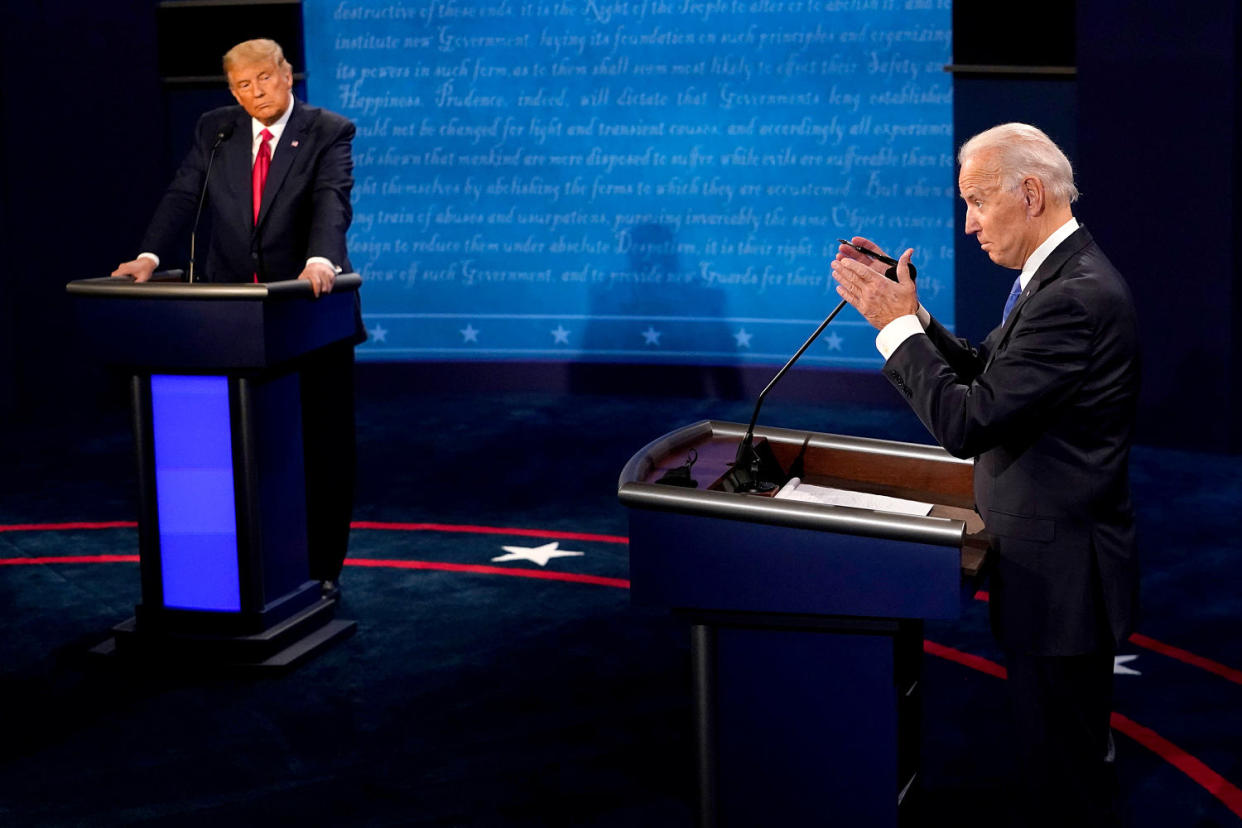Opinion | Live audiences don’t belong in a presidential debate

- Oops!Something went wrong.Please try again later.
- Oops!Something went wrong.Please try again later.
For months, President Joe Biden declined to confirm whether he’d participate in the usual presidential debates. Instead, Biden suggested his participation in this election ritual hinged in part on former President Donald Trump’s “behavior.” Meanwhile, Trump was insisting that he’d like to debate Biden 10 times and issuing challenges to debate him “anytime, anywhere, any place.” Finally on Wednesday, Biden suggested two debates with Trump (plus a vice presidential debate). But the president proposed a particular set of conditions: He didn’t want them hosted by the Commission on Presidential Debates, he wanted them held earlier on the calendar, and he wanted to get rid of the audience.
Most of Biden’s proposed changes aren’t particularly consequential. Despite some fuss from some commentators about breaking with the CPD, the Republican Party withdrew from the commission two years ago. And working outside of the commission format is no death knell for the tradition of debate. Biden and Trump have agreed to work directly with CNN and ABC directly for two debates, which are scheduled for June and September. That’s much earlier in the year than usual, which poses a trade-off: On the one hand, it’s possible that fewer people will tune in, with Election Day still far away; on the other hand, coverage of the debates might make people start thinking about the election earlier than they would otherwise, and could help kick-start activism and mobilization earlier on.
The reality is it’s hard to get worked up about the debates this year because this contest is a rematch, and both candidates are so well known. But there is one component of Biden’s new debate terms that is commendable and should be preserved for the future: kicking out the audience.
Earlier this week, my colleague Ryan Beckwith argued for sticking with tradition on audience. He made the case for keeping a live crowd and argued that it could help Biden. I respectfully disagree: Removing the audience is not only advantageous for Biden, but also generally good for the republic.
Audience reaction is Trump’s North Star — Trump’s thirst for attention is so central to his political persona and ambition that without a crowd to engage with the man is disoriented and rudderless. While Trump immediately accepted Biden’s debate conditions, it’s clear he was disappointed by the prospect of no audience, posting on Truth Social that he preferred “for excitement purposes, a very large venue, although Biden is supposedly afraid of crowds — That’s only because he doesn’t get them. Just tell me when, I’ll be there. ‘Let’s get ready to Rumble!!!’” As I’ve written before, Trump’s oratorical style is similar to that of an acid-tongued stand-up comic. He’ll quip, interrupt and roast his interlocutor in every way possible to get a reaction out of the audience and entertain his base. While that behavior doesn’t necessarily always land well with the crowd, particularly when it manifests as outright bullying, it is part of what keeps Trump anchored and focused. Without a live audience, Trump is deprived of feedback for some of his key instincts, and he will be pushed more easily toward policy substance — or lack thereof.
But this is bigger than Trump. As a general principle, debates should eschew formats that make them like a gladiatorial match, and embrace rules that push the candidates toward a clear exchange of philosophies and policies. The point of a presidential debate is not to entertain people or draw in ratings for television networks, but to inform the public about political life and enhance citizen decision-making. Yet the inevitable candidate focus on eliciting live audience reaction — applause, laughter, gasps, jeers — takes us away from the mission. That so much of the media spends so much time discussing who “won” a given debate, in part by assessing audience reaction, is an affront to serious civil society. Of course charisma or rhetorical dexterity will inevitably factor into how voters perceive candidates. But a live audience only further incentives personal barbs, quips and slick sophistry that diverts the conversation from what's actually at stake in an election. Let people react at home, and let the debate be purely about the candidates and their ideas.
Removing an audience from a debate won’t revolutionize them. The gamification of debates will remain a media and political problem. But it’ll take away a crutch for sly demagogues like Trump and move us one step closer to delivering on their true purpose.
This article was originally published on MSNBC.com

